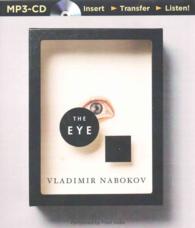- ホーム
- > 洋書
- > 英文書
- > Business / Economics
Full Description
Early Modern Knowledge Societies as Affective Economies researches the development of knowledge economies in Early Modern Europe. Starting with the Southern and Northern Netherlands as important early hubs for marketing knowledge, it analyses knowledge economies in the dynamics of a globalizing world.
The book brings together scholars and perspectives from history, art history, material culture, book history, history of science and literature to analyse the relationship between knowledge and markets. How did knowledge grow into a marketable product? What knowledge about markets was available in this period, and how did it develop? By connecting these questions the authors show how knowledge markets operated, not only economically but also culturally, through communication and affect. Knowledge societies are analysed as affective communities, spaces and practices. Compelling case studies describe the role of emotions such as hope, ambition, desire, love, fascination, adventure and disappointment - on driving merchants, contractors and consumers to operate in the market of knowledge. In so doing, the book offers innovative perspectives on the development of knowledge markets and the valuation of knowledge.
Introducing the reader to different perspectives on how knowledge markets operated from both an economic and cultural perspective, this book will be of great use to students, graduates and scholars of early modern history, economic history, the history of emotions and the history of the Low Countries.
Contents
Introduction: knowledge - market - affect: knowledge societies as affective economies Part 1: Wish economies and affective communities 1. Knowing the market: Hans Fugger's affective economies 2. Pennetrek: Sir Balthazar Gerbier (1592-1663) and the calligraphic aesthetics of commercial empire 3. Affective projecting: mining and inland navigation in Braunschweig-Lüneburg 4. The secret of Amsterdam: politics, alchemy and the commodification of knowledge in the 17th century 5. Liefhebberij: a market sensibility 6. The shaping of young consumers in early modern book-objects: managing affects and markets by books for youths Part 2: Marketing and managing knowledge and affects 7. Marketing arctic knowledge: observation, publication, and affect in the 1630s 8. Coordination in early modern Dutch book markets: 'always something new' 9. The spectacle of dissection. early modern theatricality and anatomical frenzy 10. Rubbed, pricked, and boiled: coins as objects of inquiry in the Dutch Republic 11. The Amsterdam stock exchange as affective economy







